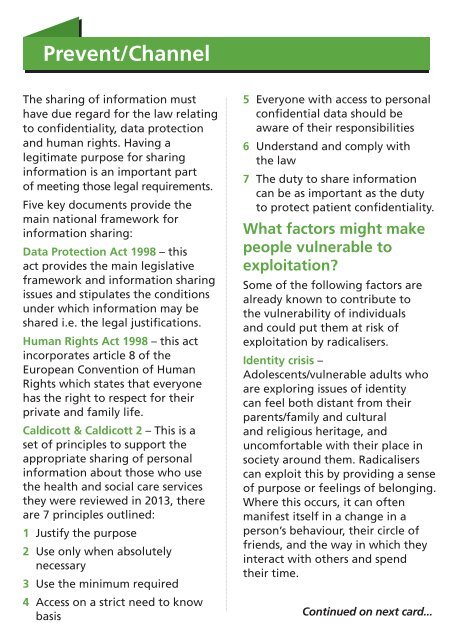Safeguarding Adults
Safeguarding-Adults-Pocket-Book-1
Safeguarding-Adults-Pocket-Book-1
Create successful ePaper yourself
Turn your PDF publications into a flip-book with our unique Google optimized e-Paper software.
Prevent/Channel<br />
The sharing of information must<br />
have due regard for the law relating<br />
to confidentiality, data protection<br />
and human rights. Having a<br />
legitimate purpose for sharing<br />
information is an important part<br />
of meeting those legal requirements.<br />
Five key documents provide the<br />
main national framework for<br />
information sharing:<br />
Data Protection Act 1998 – this<br />
act provides the main legislative<br />
framework and information sharing<br />
issues and stipulates the conditions<br />
under which information may be<br />
shared i.e. the legal justifications.<br />
Human Rights Act 1998 – this act<br />
incorporates article 8 of the<br />
European Convention of Human<br />
Rights which states that everyone<br />
has the right to respect for their<br />
private and family life.<br />
Caldicott & Caldicott 2 – This is a<br />
set of principles to support the<br />
appropriate sharing of personal<br />
information about those who use<br />
the health and social care services<br />
they were reviewed in 2013, there<br />
are 7 principles outlined:<br />
1 Justify the purpose<br />
2 Use only when absolutely<br />
necessary<br />
3 Use the minimum required<br />
4 Access on a strict need to know<br />
basis<br />
5 Everyone with access to personal<br />
confidential data should be<br />
aware of their responsibilities<br />
6 Understand and comply with<br />
the law<br />
7 The duty to share information<br />
can be as important as the duty<br />
to protect patient confidentiality.<br />
What factors might make<br />
people vulnerable to<br />
exploitation?<br />
Some of the following factors are<br />
already known to contribute to<br />
the vulnerability of individuals<br />
and could put them at risk of<br />
exploitation by radicalisers.<br />
Identity crisis –<br />
Adolescents/vulnerable adults who<br />
are exploring issues of identity<br />
can feel both distant from their<br />
parents/family and cultural<br />
and religious heritage, and<br />
uncomfortable with their place in<br />
society around them. Radicalisers<br />
can exploit this by providing a sense<br />
of purpose or feelings of belonging.<br />
Where this occurs, it can often<br />
manifest itself in a change in a<br />
person’s behaviour, their circle of<br />
friends, and the way in which they<br />
interact with others and spend<br />
their time.<br />
Continued on next card...


